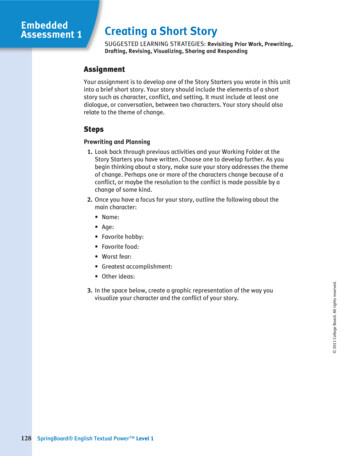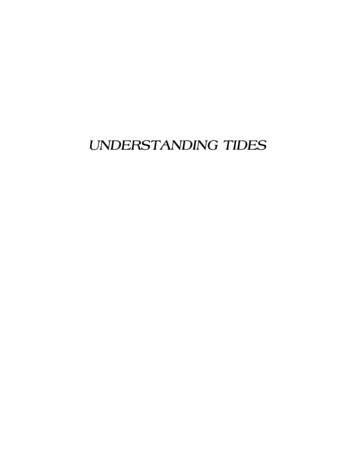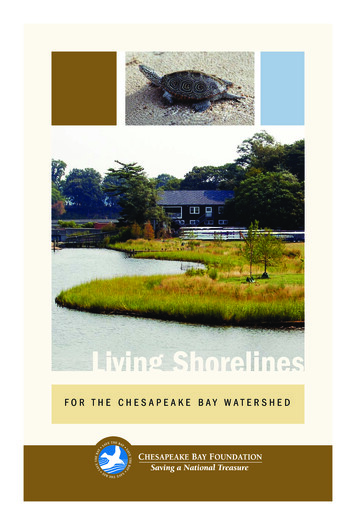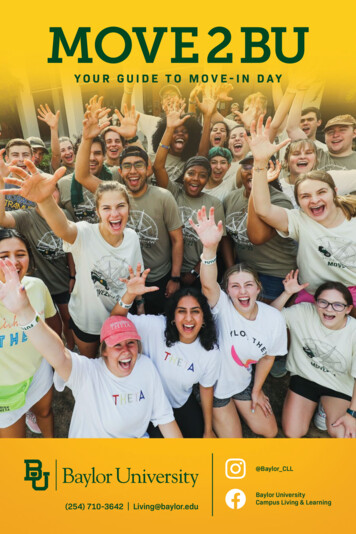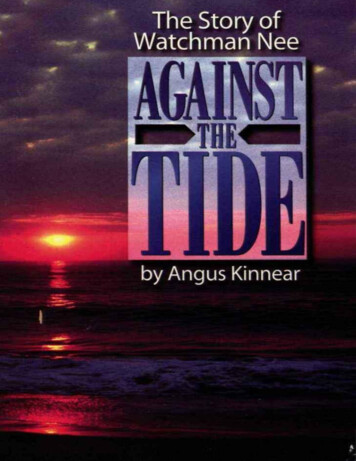
Transcription
CONTENTSForeword: by Leslie T. LyallPrefaceWho's Who1. The Gift2. Honor Your Ancestors3. Revolution4. Dedication5. Across the Grain6. The Proof of Faith7. Foreign Fields8. The Old Wineskins9. Fragile Clay10. Disenchantment11. New Horizons12. Rethinking13. Heyday14. Withdrawal15. Return16. Consistent Choice17. The Trap Closes18. Ordeal19. Suppressive Action20. UnhinderedNotes on the TextMaps:ChinaFoochowShanghai
To Jean
FOREWORD/N EVERY age of human history, men and women have emerged withqualities of character and intellect which have been recognized by theircontemporaries as qualifying them for leadership. In the history of Europe thenames of Garibaldi, Napoleon, Cromwell, and Churchill at once come to mind.North America has produced an Abraham Lincoln, a George Washington, and anIke Eisenhower. All these men have impressed their personalities on theircontemporaries, and their convictions have altered the course of history. Theywere men of destiny.So too in sacred history. Abraham was the founder of Israel. Moses molded acommunity of Hebrew slaves into a potentially great nation. David, despite hishumble origin, became king of Israel and Judah. But what is so refreshing and soencouraging to us who know ourselves to be far from perfect is to see thehonesty of the sacred historians in depicting the lives and the work of theirheroes. Moses was not always the meekest of men, and even after he had learnedmeekness he impetuously forfeited the hoped-for privilege of leading his peopleinto the Promised Land. David, the man after God's own heart, at the height ofhis power sank to the lowest moral depths and set in motion a sequence of tragicevents affecting his family and the nation.The history of the Christian church is studded with the names of "men ofdestiny": Paul, Augustine, Francis of Assisi, Luther, Calvin, Xavier, Knox,Wesley, Zinzendorf, Livingstone, Carey, Hudson Taylor, C. T. Studd, etc. But noone who has read the intimate biographies of these men can be unaware that theywere all very human and that their sanctity did not deliver them from errors ofjudgment nor even serious mistakes which affected their followers, the Christianchurch as a whole, and the missionary movement in every continent.China, like the other great fields of missionary endeavor, has produced hernational heroes—men of spiritual stature to serve their own generation in thewill of God. Pastor Hsi, the converted scholar and drug addict, pioneered thechurch in Shansi in the last century and composed hymns of beauty and spiritualunderstanding. Heroic Chinese Christians chose death rather than deny theirfaith in the Boxer massacres of 1900. Men like Wang Chi-t'ai called the churchto revival in 1910. Ting Li-mei also exercised his gifts as an evangelist in theearly years of the Nationalist revolution. Dr. James Yen pioneered masseducation in China in the name of Christ. Dr. Ch'eng Ching-yi, in the early days
of the Chinese Communist Party when the Chinese church was being seriouslythreatened, summoned the church to revival and dependence on God alone. Dr.John Sung and Dr. Andrew Gih profoundly stirred the Christian church and ledmany to faith in Christ during the '30s. Marcus Cheng was a gifted Bible teacherand writer, while Dr. Chia Yu-ming was an outstanding Biblical scholar andconvention speaker right up to his death at the age of over 90. And in an erawhen association with foreign missionaries was embarrassing and unpopular,men like Chang Lin-shen (True Jesus Church), Ching Tien-yin (Jesus Family),and Watchman Nee (Little Flock) headed movements independent of foreignmissions and the traditional denominations. Wang Ming-tao maintained anindividual independence without starting a separate movement and exercised anationwide influence on the churches.The list of outstanding Chinese Christians is long, but the records of most ofthem have never been written; and so everyone will welcome the life story of aman whose name has become a household word among Christians all over theworld. Watchman Nee personally wrote and published only one book, but he leftan almost complete record of his sermons, lectures, and conference addresseswhich were published in the several magazines he edited. Some of these AngusKinnear has collected and skillfully edited under such titles as The NormalChristian Life, Changed into His Likeness, and Love Not the World. Over theyears Dr. Kinnear has also collected much historical information about the lifeand work of Watchman Nee, whom he came to know personally in England in1938.Calvin Chao, a first generation Christian who became an outstandingevangelist and student worker, once said that it takes a third generation Christianto produce the maturity and depth of insight needed to expound the mysteries ofthe gospel with the pen of an Andrew Murray or a Bishop Handley Moule.Watchman Nee, unlike Calvin Chao and other contemporary leaders, was a thirdgeneration Christian, and to him was certainly given an insight into Biblical truthwhich is unique. Few modern Chinese preachers have so glorified Christ and soedified their hearers as did Watchman Nee from the depth of his experience andthe breadth of his reading.But, like David and Paul, Wesley and Studd, Watchman Nee was not freefrom human error and human frailty. His insistence on the "one locality, onechurch" principle led him into separatism and a denunciation of all churchesother than his own, and this inevitably caused deep division in the Body ofChrist. His well-intended but misconceived venture into industry and commercealienated him from his own church people, hindered his usefulness to God for atleast five years, and provided a weapon for the Communists to use against him.
His belated attempt to emulate the early Church and to impose on his churchesthe practice of having all things in common again divided his followers andpresented his enemies with ample grounds for criticism and condemnation.These were the kinds of aberration which almost inevitably occur when a singleindividual both starts and then controls a movement, lacking the credit checksand doctrinal safeguards of the more established churches. Church history,ancient and modern, contains plenty of examples of this principle. So lessons areto be learned from Angus Kinnear's biography.But when the history of the Chinese church comes to be written, it will beimpossible to ignore the life and work of an outstanding leader whose influencewill last and whose legacy may well be a Christian fellowship which will survivethe fires of persecution and the attempts being made to destroy the Christianchurch in China. Watchman Nee was surely another "man of destiny" whoendured to the end as seeing Him who is invisible. In twenty years ofimprisonment he never betrayed his Lord. Among his converts, colleagues andfollowers, as in other branches of the church, there are many of like courage andfaith in God who live on to continue the testimony.Leslie T. Lyall
PREFACETHIS ACCOUNT of the life and ministry of Watchtman Nee is presentedfrom the standpoint of an observer at a distance who has at no time beeninvolved in the China scene. When in 1938, as a young missionary about toleave Britain for India, I was privileged to spend some valuable weeks with him,I found my whole outlook on Christian life and service greatly enriched andgiven a fresh direction and purpose; and now that there has fallen to my lot thetask of setting his remarkable story in writing, he has once again profoundlyaffected my thinking. For, as one might expect, his message proves to beinextricably woven into his life. By setting the one in the context of the other andmaking full use of his own many interpretive anecdotes, we are able to traceGod's hand in the course of his pilgrimage through a scene of world-shakingevents.Over the years I have been privileged to meet and converse with many whoknew Nee intimately, and it is largely to these that I owe the vivid picture it hasbeen possible to reconstruct in these pages. Some earlier encounters were, alas,all too brief, and it is to my sorrow that prevailing circumstances have notallowed me to pursue some of them further. Of these personal accounts, manyhave helpfully dovetailed to reinforce one another, but for some details I havehad to rely—and have felt it right to do so—upon the evidence of singlewitnesses quoting from memory. Furthermore, occasionally, where the evidencewas slender, I have had to make my own prayerful deductions as to precisetimings and sequences and, for the sake of brevity, to take a few short cuts. Forany errors and inconsistencies I must assume personal responsibility, as also formy assessments of Nee and his colleagues. I wish to apologize in particular forany pain or inconvenience that might possibly arise from my misunderstandingof the meanings, causes, or motives behind events.I have been given a great deal of assistance by many people, and in the firstplace I must record the immense debt I owe, in all my work for Watchman Nee,to the gifted versions and transcriptions by the late Miss Elizabeth Fischbacherof the best of his preaching and writing. She has skillfully captured andpreserved the spirit of the man, and her contributions have appeared, hithertounacknowledged, in the series of books by Nee I have been privileged to edit.They are drawn upon again in the present volume. In the interpretation of events,the view I have taken owes much at several critical points to the mature spiritual
wisdom of another servant of God. I refer to Watchman's friend from boyhooddays, the late Mr. Faithful Luke.At different periods I have received much help in the form of reminiscencesand impressions, private documents, translations, etc., from the following: T.Austin-Sparks, Hubert L. Barlow, David Bentley-Taylor, Joy Betteridge,Dorothy Beugler, Lena Clarke, Elizabeth Fischbacher, Theodore Fischbacher,Mrs. Nancy Gaussen, Doris E. Hinckley Herald Hsu, Hilda Holms, VictoriaHolms, Mary Jones, Sophia Jorgensen, Stephen Kaung, Witness Lee, GaylordLeung, Serene Loland, Faithful Luke, Leslie T. Lyall, James Ma, Shepherd Ma,George McHaffie, Kristeen Macnair, Simon Meek, Joy Meggach, D. VaughanRees, Mrs.Carol T. Stearns, Newman Sze, A. G. Taylor, Mary Wang, K. H. Weigh,Mary Weller, Mrs. Betty Williams, Lucas Wu, and Alan C. L. Yin. Printedsources are acknowledged in the Notes.I should like also to express my gratitude to Miss Jean Wood and MissRosemary Keen of the Church Missionary Society and to Dr. Jim Broomhall andMiss Irene King of the Overseas Missionary Fellowship for their willing help,and to Hugh Fuller of Victory Press for his encouragement and long patiencewhile I have been writing this book. And I wish to thank most warmly the fourwho have read through the manuscript and helped so constructively with advice:Gaylord Leung, Janet Killeen, Leslie T. Lyall, and my wife Jean, who also did allthe typing.A word about the transliteration of Chinese names. Except where olderspellings have been universally used, I have tried to follow the Wade-Gilessystem, but without the "frills." That is to say, as in newspapers and referencebooks, I have omitted the accents and apostrophes as being meaningless to thegreat majority of English readers. Inconsistencies and misspellings are due to myown ignorance of Chinese. To reduce the number of difficult personal names inthe text, I have supplied a Who's Who of the Nee family and other maincharacters in the story.The "Notes on the Text" (at the end of the volume), besides acknowledgingvaluable sources and supplying hints for further reading, are designed to embodya fairly full bibliography of Watchman Nee's writings and edited addressesavailable in English up to the date of this publication, linked where possible withtheir date of origin and historic setting.The task of preparing this book has been a rewarding one in which I havebeen aware of the constant help of God. To His hands, for His use, I now entrustitANGUS I. KINNEAR London, 1973
WHO'S WHOTHE NEE (NI) FAMILY (in the Foochow dialect: NGA)Watchman s Grandfather:The Rev. Nga U-cheng (U. C. Nga) of Foochow, born c. 1840;Congregational pastor with the American Mission Board, Foochow. Died 1890.Watchman s Parents:Ni Weng-hsiu (W. H. Ni) or Nga Ung-siu of Foochow, born 1877, the fourthof nine boys. Officer in the Imperial Customs Service. Died in Hong Kong,December 1941.Lin Huo-ping (Peace Lin) of Foochow, born 1880.Died in Swatow, 1950.Their Nine Children:1. Ni Kuei-chen, born 1900 (Mrs. H. C. Chan).2. Ni Kuei-cheng, born 1902 (Mrs. P L. Lin).3. Ni Shu-tsu or Henry Nee (or in the Foochow dialect Nga Shu-jeo), bornin Swatow, November 4,1903; renamed (i) Ni Ching-fu, (ii) Ni To-sheng orWatchman Nee. Married Charity Chang. Died in AnhweiProvince, June 1,1972.They had no children.4. Ni Huai-tsu or George Nee, research chemist.5. Ni Sheng-tsu, died in school years.6. Ni Tek-ting (Mrs. L. H. Wong).7. Ni Teh-ching (Mrs. Chang).8. Ni Hong-tsu or Paul Nee.9. Ni Hsing-tsu or John Nee.THE CHANG FAMILYCharity's Father:The Rev. Chang Chuen-kuan (C. K. Chang) of Foochow, pastor in Tientsinwith the Christian and Missionary Alliance.His Children:1. Chang Pin-tseng or Beulah Chang (Mrs. G. S. Ling).2. Chang Pin-fang or Faith Chang (Mrs. K. L. Bao).3. Chang Pin-huei or Charity Chang (Mrs. Watchman Nee). Died in Shanghai,October 1971.4. Chang Yi-lun or Samuel Chang.SOME CHRISTIAN LEADERS AND WORKERSA denotes those directly associated with the Church Assembly Hall ("Little
Flock" Movement) John Chang (Chang Kwang-yung) early Shanghai worker. James Chen(Chen Tseh-hsin) of Amoy, worker in Hong Kong. Stephen Kaung (Chiang Sheo-tao) worker in Chungking. Miss Ruth Lee(Li Yuen-ju) worker in charge of Shanghai Book Room. Witness Lee (Li Shang-chou) of Chefoo; later senior worker in Shanghaiand Taiwan. Philip Luan (Luan Fei-li) of Shantung, worker in Hangchow. Faithful Luke (Liok Tiong-sin) of Kutien, worker in Indonesia. Shepherd Ma (Ma Muh) Christian merchant in Shanghai. Simon Meek (Miao Shou-hsun) of Lieng Chieng, worker in Manila.Mary Stone, M.D. (Shih Ma-yu) first Chinese woman doctor and founder ofBethelHospital, Shanghai.John Sung, Ph. D. (Sung Ju-un) revivalist preacher associated with theBethel Evangelistic Band. Daniel Tan (Chen Chu-yen) of Amoy, worker in Singapore. John Wang (Wang Lien-chun) elder in Foochow.Leland Wang (Wang Tsai) of Foochow, founder of China OverseasMissionary Union.Wang Ming-tao, fundamentalist pastor of the Tabernacle, Peking. Miss Peace Wang (Wang Pei-chen) worker in Shanghai.Wilson Wang (Wang Tse) of Foochow, brother and colleague of LelandWang. K. H. Weigh (Wei Kwang-hsi) of Kutien, worker in Hong Kong.K. S. Wong (Wong Kai-seng) Christian merchant in Singapore. Lukas Wu (Wu Jen-chieh) of Tsin-kiang, worker in Manila. Dr. C. H. Yu (Yu Cheng-hua) ophthalmologist, elder in Shanghai.Miss Dora Yu (Yu Tsi-tu) evangelist and Bible teacher used in the conversionof Watchman Nee. She died in 1931. Alan C. L. Yin, Christian manager of Sheng Hua Pharmaceutical Company.China
Foochow
Shanghai
1THE GIFTSPRING was well advanced in the Middle Kingdom and the season of PureBrightness had given way to the season of Corn Rain. The night air was clear,with fleecy clouds drifting across a silvery moon. Foochow-fu had closed itsseven gates beneath their fantastic storied towers. From the crumbling,crenellated walls obsolete cannon looked out over broad ricefields and spreadingsuburbs. Foot traffic had ceased on the eight-century-old Bridge of TenThousand Ages that linked the town on the north bank with Chung-Chou andNantai islands. Tonight no mist shrouded the huddled sampans of the boatdwellers on the River Min.Among the close-packed streets and houses the day's cacophony had longsince died. Gone were the rhythmic noises of the streetside craftsmen, the songof bamboo coolies hefting giant loads, the grinding of huge pestles hulling rice,the unending slip-slip of straw sandals, the squeal of trussed pigs borne tomarket, the cries of hawkers and the whining pleas of beggars. All these hadfallen silent and so, too, very gradually, had the last home-bound footstepsthrough the narrow lane: a sedan chair with toiling bearers bringing home a lateworking scholar official; a chattering band of longshoremen returned fromloading a junk to catch the tide; a shuffling addict drawn along by his ceaselesscraving for the deadly "foreign smoke." Now at last, all was still. In the ramblingNga home the large household slept.Po-po! po-po! Beside her sleeping husband Lin Huo-ping stirred uneasily onher mat, aware tonight of the third child secretly within her. She listened. FromKuei-chen and from the little one there was only quiet breathing. Po-po! po-po!Again that staccato sound, and louder. It must be the night watchman on hiscircuit, alert while most men slept, to give the alarm of fire or thief or anydanger. Po-po! po-po! The assuring clapper-note (to-sheng) of his bamboo rattlewas receding now as the voice came reedlike, calling: Past midnight, neighbors.All is well!An oil lamp with floating wick bathed the little room in its faint glow. The
flame guttered and flared as Huo-ping lay back, assured that all was well. Sheclosed her eyes once more, but not to sleep. Again, perhaps for the hundredthtime, she whispered, "Let it be a boy!" She recalled with burning resentmenttoday's household gossip, the barbed, mocking words that had made this visit toher in-laws' home so painful. Chinese society placed a premium on maleoffspring, and to her gentle Nga Ung-siu she had already borne two girls. HerCantonese mother-in-law had been furious. The unfortunate wife of her eldestson could conceive only females—six of them—and Ung-siu's woman, sheaffirmed, was another just like her. 'Avenge me, O God," Huo-ping cried now inbitterness, "and take away this reproach!" Then somehow there came back to hermind the half-hearted promise she had made and as quickly forgotten when, ayear back, her second child was on the way. "God," she had prayed then, inwords that echoed Hannah's, "if You will give me a little boy, I will give himback to You to be Your servant all his days."1 They were good familiar words.She had known the Samuel story from childhood. But now, all at once theyaroused in her heart an impulse she had not felt before. She would not only saythem; she would mean what she said. She did not hesitate. "I'll keep my word,Lord!" she exclaimed. Quiet then came to her at last. Smiling, she drifted backagain to sleep.Long weeks were to pass, and a return journey by sea to their home inSwatow But her pangs came at length, and oh, the inexpressible relief when sheheard her husband cry, "It's a boy!" Tension was released in tears as joyoverwhelmed her. This time, therefore, when the red-tinted duck eggs went outto the neighbors and friends, it was to announce the longed-for son and heir.Thus on November 4,1903, Henry Nga came into the world to be the delightof his quiet father and his strong-willed mother. Chinese names are significant, achild being given or assuming a new one at some fresh turning point in hiscareer. At first, in the family tradition, he was Nga Shu-jeo in the Foochowdialect, or in Mandarin, Ni Shu-tsu, "he who proclaims his ancestor's merits."Years later, however, conscious of a new mission in life, he sought a fresh nameexpressing his sense of duty to his people as God's seer and spokesman. For awhile he called himself Ching-fu, "one who gives warning or admonishes"; butthis concept seemed harsh and he was not wholly satisfied. It was his motherwho then proposed To-sheng, a gong-note or tocsin,2 reminding him of herpromise in the waking night while the watchman beat through the streets hisbamboo gong or rattle (to) to emit its far-reaching note (sheng). So he became NiTo-sheng, or in English, Watchman Nee, and thus we shall generally know him.He disciplined himself through life to be like Samuel, alert while others slept,
God's priestly bell-ringer who should warn His people of peril or arouse them toa new day's dawn-ing.3
2HONOR YOUR ANCESTORSFOOCHOW is the Fukien provincial capital and I one of China's gatewaysto the southern ocean. For generations it had been home to the Nga (or Nee)family, whose members went each spring to a nearby hillside to tend the gravesof their ancestors. In 1839, around the time when Watchman's grandfather NgaU-cheng was born, hostilities had broken out between China and Britain over thegalling imperial restrictions on foreign trade. The three-year Opium War thatfollowed ended in China's humiliation and the forcible opening of diplomaticrelations with the West. The Treaty of Nanking, by which in 1842 Hong Kongwas ceded to Britain outright, also opened Foochow and four other seaports toforeign commercial intercourse, with all its scandals and abuses. While thenative coastal trade went on—in timber, paper, fruits, and textiles—there nowarose alongside it a new and unwelcome business settlement of foreign factoriesand residences on the midriver islet of Chung-Chou and the farther slopes ofNantai Island.Fifty years earlier the learned Emperor Chien Lung, knowing perhapssomething of British encroachment in India under Clive and Warren Hastings,had patiently explained in a letter to George III of England that his Empire's selfcontained economy had no room for the curious products of people living faraway in the depths of the sea. 'As your envoy can see for himself, we possess allthings. I set no value on objects strange and ingenious, and have no use for yourcountry's wares." In official circles that view still prevailed Yet Europeincreasingly demanded Chinese porcelain, silk, and lacquer; and since byimperial edict barter was denied them, the English merchants must pay in silver.This serious problem was resolved only when they found that the Chinese couldbe induced to buy Indian opium. The principle of exchange could then be madeto work to the foreigner's advantage, and by 1851 the resistance of the Son ofHeaven had been so eroded that opium was legalized.The thing that above all else caused trade to soar was Europe's demand fortea. By 1853, when Nga U-cheng was around fourteen, the first cargoes ofFoochow tea, brought downriver from the Wu Yi Shan highlands, were already
being shipped from that Min River port to markets in Europe and America. Soonthe tall China clippers with great names like Taepingand Thermopylae, Ariel andFlying Spur, were to make this port second only to Shanghai in the prosperoustea trade.The entry to China of Protestant Christianity as an accompaniment of theforeign trade was another consequence of the Opium War and the NankingTreaty. Of the events of 1842, a contemporary Western writer could say withastonishing complacency: "The ways of God's dealings with this people began toopen, and He entered into judgment with them that He might show them Hismercy."1 The vermilion pencil of the emperor had decreed that the Christian faithbe tolerated throughout the Middle Kingdom, but the decree had been extractedunder military pressure. Nevertheless, it threw wide the door for Westernmissionaries with their social concern and evangelistic zeal to move in and stakeout new claims for righteousness in Chinese hearts.This they quickly did At Foochow the first missionaries to arrive in 1847were Congregationalists of the American Board, to be followed the same year byAmerican Methodist Episcopals and in 1850 by Anglicans of the English ChurchMissionary Society The missionaries were not slow to protest against theiniquitous opium traffic; yet as redhaired aliens claiming extraterratorialprivileges, they could scarcely be distinguished in native minds from the tradersand their trade.The first school offering Western-style education was opened by theAmerican Board in a suburb of the old city in 1853, and it was here that as a boyWatchman Nee's grandfather, Nga U-cheng, heard of the love of God in JesusChrist and was won to Him. Four years later, in 1857, the year in which the firstChristian church in Foochow came into being, he was one of a group of fourpupils baptized in the Min River. He progressed so well that the missionariestrained him as an evangelist, and soon with other young men he was proclaimingthe gospel of the Lord Jesus in this city of half a million souls. Eventually hewas ordained a pastor, the first Chinese to be so honored in the three northFukien missions.2 He had a gift for expounding the Scriptures for which, afterhis death in 1890, he was long to be remembered.It was when as a maturing young man his time came to marry that his big testcame, for very few women in Fukien as yet believed in Christ and for him nolocal Christian girl could be found. Foochow folk of those days were extremelyconservative and would on no account transgress custom to intermarry withthose of another province; yet he must either look farther afield or compromisehis testimony. It says much for him that his faith prevailed over tradition. From
Canton, 450 miles away by coastal boat, he accepted a Kwangtung girl whoproved to be God's choice for him and made him a true, if somewhat sharptongued, life partner.They were blessed (in Chinese eyes) with nine boys. Of these, Watchman'sfather, Nga Ung-siu, was the fourth, being born in 1877. As a pastor's son he wasgiven Christian elementary schooling, and then went on to study the Confucianclassics for the competitive examinations. Foochow was a literary center wheretwice in every three years several thousand students from the prefecture gatheredfor the first degree examinations, and again twice in five years from the wholeprovince for those of the second degree. With age-old ceremony, at the appointedtime Ung-siu and a throng of others entered the vast examination area northeastof the city, by a gateway that bore the characters: "For the Empire: Pray forGood Men." Confined there for three days in his own individual cell, he adornedhis scroll of ruled paper with columns of beautiful characters, pouring out hisclassical knowledge in a poem and two essays on the theme now set. The paperswere judged with strict impartiality, and his success in the second degree gainedhim, shortly before his marriage, the post of a junior State Customs officer.His young wife, Lin Huo-ping, had been born in 1880 of peasant stock, thelast of a big family. Very poor and darkened by superstition, they lived in fear ofdemons and dragons and fox-fairies. It was a famine year in Fukien; and with somany hungry mouths to feed she stood little chance of survival. Even in normalconditions an infant girl, just because she was one too many, might be exposedor drowned or buried alive by her father. Indeed, a child still living, if sickly orpining from hunger, might be cast, along with the dead, into the high aperture ofFoochow's capacious baby tower, an urn-shaped granite receptacle at the town'sedge, designed to save the expense of child burials. For just a few girls theRoman Catholic orphanage outside the southern gate offered a home. Theinscription over its entry ran: "When thy father and thy mother forsake thee, theLord will take thee up."But Huo-ping's father did not forsake her utterly. For the three or four dollarshe so desperately needed he sold her, through a go-between, to a better-offfamily in the city who thought of bringing her up as a slave girl. But she was alively child, and soon this family was approached, again through an emissary, bya merchant named Lin in a foreign firm in Nantai. His concubine was barren anddesired to adopt her as a daughter; so again Huo-ping changed hands. In theprovidence of God the merchant, too, loved children, and here she found a home.Though there were already two boys and a girl in the family, the couple took thespirited little newcomer to their hearts and brought her up as their own child.When she was six, according to the almost universal custom, her adoptive
mother began binding her feet. By this procedure, the toes were balled under thesole and the as yet unossified heel and tarsus forced together, the bindings beingtightened daily to withstand growth and hobble her for life. As a peasant girlHuo-ping would have escaped this treatment, for the Foochow field women hadlong resisted the custom. They strode about fiercely adorned with daggers intheir hair and took their place alongside boys and grown men in the ricecultivation. But though she wept copiously each morning from the cruel pain,she never once thought of resisting. She was a merchant's child now, destined forbetter things. Lily feet were a part of the price she must pay.But that year Mr. Lin became ill with a mysterious disease that defied theskills of all the doctors. Now it happened that a business superior of Lin's namedChang had become a Christian Methodist, and this man suggested that they askthe Methodist pastor to come and pray for him. They could scarcely refuse, andprayer was answered; and so impressed were the Lins with his dramatic recoverythat they sought Christian instruction. Believing at length in the Lord Jesus, theythrew out the ugly little idols from their place of honor in the home, and Mr. Linand his wife were baptized into the Methodist church near his place ofemployment. Because it was closer at hand for them, however, the concubineand her child attended the Church of England. To Huo-pings great joy, thepainful foot-binding now ceased and she could run again freely. As she learnedthe hymns and Bible stories, she found her heart warming to divine things. Hernew happiness soon proved infectious. Asked by her primary teacher why shewas always singing, she told him the family's story, with the eventual result thathe, too, with his wife and children, joined the church.A foreign businessman had opened a primary school in their neighborhoodwith Christian teachers, and here Huo-ping was sent to study, going on in 1891,a
Watchman Nee, unlike Calvin Chao and other contemporary leaders, was a third generation Christian, and to him was certainly given an insight into Biblical truth which is unique. Few modern Chinese preachers have so glorified Christ and so edified their hearers as did Watchman Nee from the depth of his experience and the breadth of his reading.




